构词法(派生)
英语主要有三种构词法
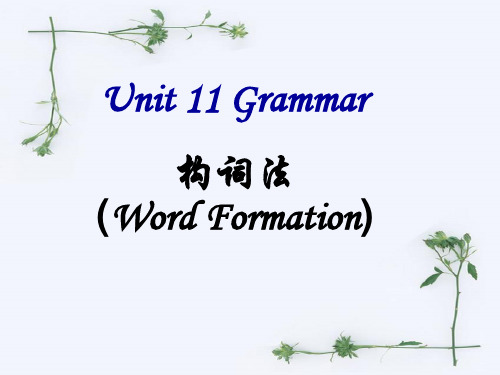
Language points (word study)
1.belief n. 信任, 信心, 信仰 常
与in连用
have a belief in 相信, 信任 That man has a strong belief in God. 那个男子虔诚地信仰上帝。 He has lost the belief in God. Beyond belief 无法令人相信;令人难以置信 His story is beyond belief. 他的话难以置信。 a common belief 普通的信念 religious belief 宗教信仰
2.名词转化为动词 e.g The hall can seat two thousand people They have booked their plane ticket.
3.形容词转化为动词
e.g. The car slowed down to half its speed.
The room gradually quieted down.
动词:
-fy (使…化) ; -ize (使…成为) e.g. simplify(简化) , satisfy , realize , organize
副词:
- ly 表示方式,程度 : freely ,badly ,truly -ward (s) 表示方向 :towards, forward, outward
后
缀
例
runner ,
词
swimmer
--er ….. 者
-ese….地方的人
Chinese, Japanese
名
-ian
精通…的人, …地方人 musician, Russian
派生词的构词方法

派生词的构词方法一、前缀派生前缀派生是指在词根前面加上一个前缀,形成一个新的派生词。
前缀可以改变词的词性、意义或语法功能。
常见的前缀有:un-、dis-、mis-、re-等。
例如:1. unhappy(不快乐):un-是前缀,表示否定,将happy(快乐)变为否定的意思。
2. disconnect(断开):dis-是前缀,表示相反,将connect(连接)变为相反的意思。
3. misunderstand(误解):mis-是前缀,表示错误,将understand(理解)变为错误的意思。
4. rebuild(重建):re-是前缀,表示再次,将build(建造)变为再次建造的意思。
二、后缀派生后缀派生是指在词根后面加上一个后缀,形成一个新的派生词。
后缀可以改变词的词性、意义或语法功能。
常见的后缀有:-able、-er、-ful、-ness等。
例如:1. comfortable(舒适的):-able是后缀,表示具有某种性质,将comfort(舒适)变为具有舒适性质的意思。
2. teacher(教师):-er是后缀,表示从事某种职业的人,将teach (教)变为从事教学工作的意思。
3. careful(小心的):-ful是后缀,表示具有某种性质,将care (关心)变为具有关心性质的意思。
4. happiness(幸福):-ness是后缀,表示某种状态或性质,将happy(快乐)变为幸福的状态或性质的意思。
三、复合派生复合派生是指将两个或更多的词根组合在一起,形成一个新的派生词。
复合派生可以改变词的意义、词性或语法功能。
常见的复合派生方法有:名词+名词、形容词+名词、动词+名词等。
例如:1. smartphone(智能手机):smart(聪明的)+phone(手机)组合在一起,形成一个新的派生词,表示具有智能功能的手机。
2. blackboard(黑板):black(黑色的)+board(板)组合在一起,形成一个新的派生词,表示用来写字或画画的黑色板。
三种英语基本构词法(派生、合成、转化)
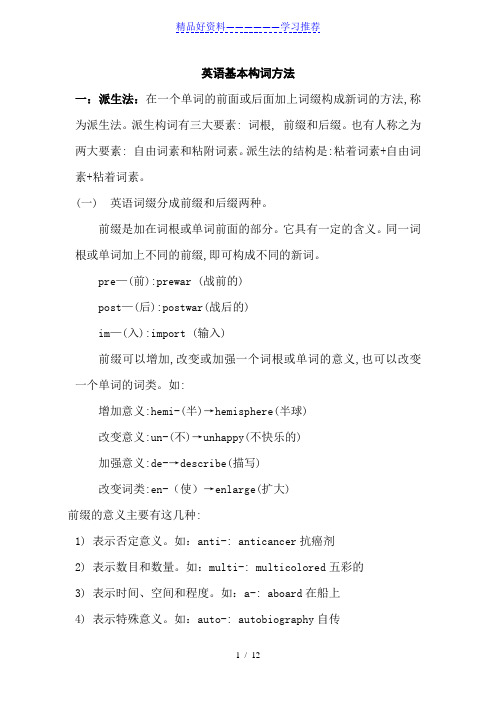
英语基本构词方法一:派生法:在一个单词的前面或后面加上词缀构成新词的方法,称为派生法。
派生构词有三大要素: 词根, 前缀和后缀。
也有人称之为两大要素: 自由词素和粘附词素。
派生法的结构是:粘着词素+自由词素+粘着词素。
(一)英语词缀分成前缀和后缀两种。
前缀是加在词根或单词前面的部分。
它具有一定的含义。
同一词根或单词加上不同的前缀,即可构成不同的新词。
pre—(前):prewar (战前的)post—(后):postwar(战后的)im—(入):import (输入)前缀可以增加,改变或加强一个词根或单词的意义,也可以改变一个单词的词类。
如:增加意义:hemi-(半)→hemisphere(半球)改变意义:un-(不)→unhappy(不快乐的)加强意义:de-→describe(描写)改变词类:en-(使)→enlarge(扩大)前缀的意义主要有这几种:1)表示否定意义。
如:anti-: anticancer抗癌剂2)表示数目和数量。
如:multi-: multicolored五彩的3)表示时间、空间和程度。
如:a-: aboard在船上4)表示特殊意义。
如:auto-: autobiography自传后缀是加在词根或单词后面的部份。
后缀有四种,即:名词后缀、形容词后缀、动词后缀和副词后缀。
后缀不仅改变词的意义,而且使单词由一种词类转化成另一种词类。
1)名词后缀,它有许多种,如:表示人:-er: worker工人;teacher教师-ist:artist艺术家;chemist药剂师表示物:-or: tractor拖拉机;generator发电机-ant:disinfectant消毒剂; dependant依附物表示抽象名词:-hood: childhood童年;neighborhood邻居关系-ship: friendship友谊;horsemanship骑马术表示集合名词:-ry: peasantry农民总称;citizenry公民总称-age: mileage英里数;teenage十几岁的时期表示场所地点:-ery: piggery养猪场;greenery花房,温室-ern: saltern制盐场;cavern洞穴表示疾病:-oma: trachoma沙眼症;neuroma神经瘤-itis: bronchitis支气管炎;arthritis关节炎表示……学::-logy:zoology动物学;anthropology人类学-ics: electronics电子学;statistics统计学2)形容词后缀表示一种事物具有或属于某种性质或状态。
英语构词法-派生法
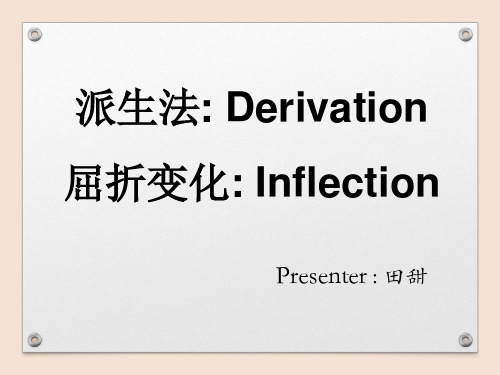
1. -fy (n./adj.→v.) 表示“使成为, 使……进入状态”。 如: beautify horrify specify purify
·
• 2. -is(z)e (adj./n.→v.)表示“使成 为,使……化”。如: memorize apologize realize modernize
•
irregular不规则的 illegal非法的
·
• 3. re- 表示“重新,再”, 用在动词 前。如:
rebuild 重新建造 recycle 再循环 reconsider 重新考虑 review 复习
·
Ⅱ.后缀 (postfix; suffix)
• I.形容词后缀
1. -able (n./v.→adj.)表示“可以……的;显 示……性质”。 如:
·
• II.名词后缀
1. -er 表示人或物。 如:
speaker passenger fire fighter owner
·
• 2. -or (v.→n.)表示人,置于动词之后。 如: competitor director editor operator
·
• 3. -ist表示“从事……者”。 如: chemist 化学家 journalist 记者 typist 打字员 scientist 科学家
·
finally quietl· 7. 其它形式:-ish, -ic, -ical, -ive, -al(n.→adj.)
foolish basic scientific medical expensive selfish personal progressive
派生法: Derivation 屈折变化: Inflection
英语构词法派生法
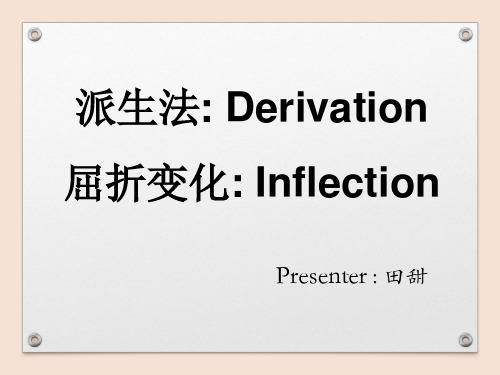
respectable comfortable valuable fashionable loveable
·
• 2. -ful (n./v.→adj.) 表示“充满……的” 如:
beautiful successful wonderful shameful hopeful
·
• 3. -less (n.→adj.) 表示“没有…… 的”。如:
派生法: Derivation 屈折变化: Inflection
Presenter : 田甜
派生法: derivation
·
• 派生法(derivation)是英语主要的构词法, 用以丰富扩大英语的词汇量。这方法是借 前缀(prefix)或后缀(postfix;suffix)之助, 制造出派生词(derivative words),主 要有名词、形容词和动词三种。
jobless homeless helpless
·• 4. -ous (n.→adj.)表示“具有……性质 的”。 如:
nervous famous dangerous poisonous humorous 幽默的
·
5. -y (n.→adj.)
funny sunny cloudy wealthy
·• 6. -ly (adj.→adv. / n.→adj.)
finally quietly lovely friendly manly
7·. 其它形式:-ish, -ic, -ical, -ive, -al(n.→adj.)
foolish basic scientific medical expensive selfish personal progressive
tall - tallest
构词法之派生法

英语构词法一、构词法之派生法的讲解英语构词法主要有:合成法,转化法,派生法,混成法,截短法和词首字母缩略法;派生 Derivation前缀后缀注意: -ese, -ian, -ist 既可以构成名词,又可以构成形容词; -er 构成的名词,既有表示人的,又有表示物的;二、课堂巩固练习Ⅰ.Match the right words from the right column with the words on the left.1. enrich A. trying to find jobs2. semicircle B. remove, get rid of ice, frost3. troublesome C. of, having, using imagination4. sharpen D. make or become sharp5. job-hunting E. half a circle6. limitless F. causing trouble7. imaginative G. make rich, improve in quality, flavour, etc.8. defrost H. without limitⅡ.Use the appropriate form of the words to fill in the blanks.1. The mother didn’t know why her daughter was crying _______. noise2. He was one of the best _______ in yesterday’s football match. play3. Look How ______ Kate is laughing happy4. It snowed _____ last night and now the streets are covered with snow. heavy5. Edison was a great ______. During his life he had many ______. invent6. More and more _____ have come to visit China over these years. foreign7. We want _________ reasons for your failure to help. satisfy8. Please give me some reference work. It will ______ my task. simple9. The boy had the _______ of being half starved. appear10. The police have _______ a plot against the President. cover11. The doctor said that Mary’s mother needed an _______.operate12. She hoped that her son would become a _______. music13. Few ______ words made us excited. speak14. The days on the moon get hotter than ______ water. boil15. Thank you for your _________. kind16. Many college students work while they are studying because they want to make some money for theircollege _____. expensive17. Most international ______ letters are written in English, too. busy18. The boy noticed an ______ mistake on his paper, but he decided not to say anything about it. correct19. When in Rome, do as the _____ do. Rome20. The teacher was pleased with her _______. honest。
语法小结:派生词构词法
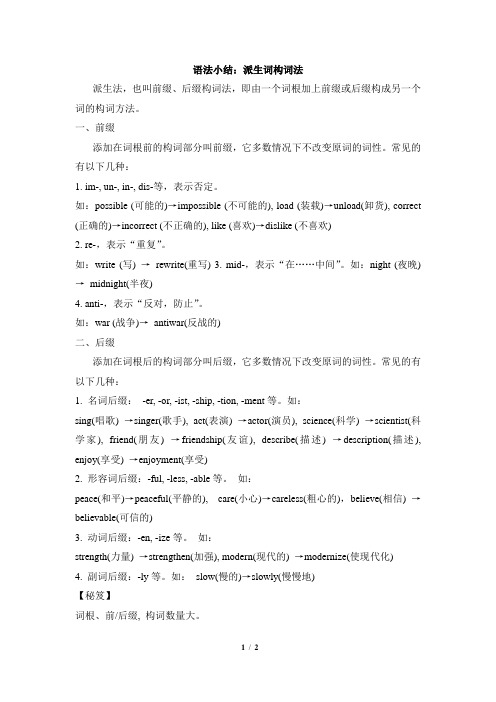
语法小结:派生词构词法派生法,也叫前缀、后缀构词法,即由一个词根加上前缀或后缀构成另一个词的构词方法。
一、前缀添加在词根前的构词部分叫前缀,它多数情况下不改变原词的词性。
常见的有以下几种:1. im-, un-, in-, dis-等,表示否定。
如:possible (可能的)→impossible (不可能的), load (装载)→unload(卸货), correct (正确的)→incorrect (不正确的), like (喜欢)→dislike (不喜欢)2. re-,表示“重复”。
如:write (写) →rewrite(重写) 3. mid-,表示“在……中间”。
如:night (夜晚)→midnight(半夜)4. anti-,表示“反对,防止”。
如:war (战争)→antiwar(反战的)二、后缀添加在词根后的构词部分叫后缀,它多数情况下改变原词的词性。
常见的有以下几种:1. 名词后缀:-er, -or, -ist, -ship, -tion, -ment等。
如:sing(唱歌) →singer(歌手), act(表演) →actor(演员), science(科学) →scientist(科学家), friend(朋友) →friendship(友谊), describe(描述) →description(描述), enjoy(享受) →enjoyment(享受)2. 形容词后缀:-ful, -less, -able等。
如:peace(和平)→peaceful(平静的), care(小心)→careless(粗心的),believe(相信) →believable(可信的)3. 动词后缀:-en, -ize等。
如:strength(力量) →strengthen(加强), modern(现代的) →modernize(使现代化)4. 副词后缀:-ly等。
如:slow(慢的)→slowly(慢慢地)【秘笈】词根、前/后缀, 构词数量大。
英语构词法中的派生法

英语构词法中的派生法派生法(derivation): 在词根前面加前缀或在词根后面加后缀,从而构成一个与原单词意义相近或相反的词。
前缀(prefix): 一般改变意义,不改变词性。
表示否定的:dis-, like---dislike, appear---disappear, agree---disagree,cover---discover,il-, legal---illegal, literate---illiterate;im-, possible---impossible, polite---impolite,mortal-immortal;in-, correct---incorrect, direct---indirect, complete---incomplete;ir-, regular-irregular, relative---irrelative,revocable---irrevocable, capable of being revoked; able to be cancelled, revoke: (transitive) to take back or withdraw; cancel; rescind ? to revoke a law2. (intransitive) cardsto break a rule of play by failing to follow suit when able to do so; renege,renege. (intransitive; often foll by on) to go back (on one's promise, etc)mis-,“错误,坏” take---mistake, understand---misunderstand, fortune---misfortune, lead---mislead, mischievous;mal-, “坏,恶的”function---malfunction, maladroit笨拙的(mal+adroit灵巧的) adjective 1. skilful or dexterous 2. quick in thought or reaction, malevolent恶意的(male+vol意志+ent→坏意志) 1. wishing or appearing to wish evil to others; malicious 2. astrology having an evil influence;non-,“不,非”’ fiction---non-fiction, non-cooperation, non-negotiable, non-stop直达的,non-profit, non-commercial;un-, “不,非”happy---unhappy, fair---unfair, like---unlike(不像),certain-uncertain,known-unknown,usual-unusual,important-unimportant, accessable---unaccessable, accountable---unaccountable, fold-unfold,前缀a-,① 加在单词或词根前面,表示”不,无,非”, acentric 无中心的(a+centric中心的) asocial 不好社交的(a+social好社交的) ;amoral 非道德性的(a+moral道德的;注意:immoral apolitical.不关政治的(a+political政治的) anemia 反常的(a+nomal正常的+ous)② 加在单词前,表示”在…,…的” ,asleep 睡着的(a+sleep睡觉),aside 在边上(a+side旁边),ahead 在前地(a+head头),alive 活的(a+live活) awash .泛滥的(a+wash冲洗),alike(相似的,一样的);前缀中的:anti-, “反对,抵抗, against,opposed to,opposite of,instead”,anti-war, antitrust, antibiotic, antioxidant,antibody, antigen, anti-semitic等;auto-, “自动的,self, personally, 表示自己”,automate, automation 自动化,autograph 亲笔,autoalarm 自动报警器,autocriticism 自我批评,autorotation自动旋转,autobiography 自传,autonomous [??'tɑ?n?m?s]a. 自治的;automatic, automatically, autonomy, automobile,automated, autopsy, autograph亲笔签名,手稿, automotive, ,autocrat 独裁者,autocracy,automata, automaton, autoclave, automaker, autoindex自动索引;co-, “共同”,coworker, collegiate, colleague, cooperate;en-, “使”,enlarge, encourage, enhance, enable, enact, enroll, encompass,inter-,“相互,between在---之间”,international, internet, interview, intercontinental洲际的,interchange, interfere, interrupt, interpose,mini-, “小”,minibus, ,miniskirt, miniature, minify, minimum, minimal最低限度的,pre-,“在---之前”,pre-school, pre-reading, preview,precede v. to go or be before (someone or something) in time, place, rank, etc, precedent. a. If there is a precedent for an action or event, it has happened before, and this can be regarded as an argument for doing it again.president, precedent. unprecedented.re-, “再,又,重复”, repeat, rewrite, retell, return, review, rebound, reflect, reclaimsub-,“在下面”,subway, subordinate, submarine, suburban(urban城区),subconscious,subscribe,super-“超,在---之上”,supermarket, superman, superstar, supersonic, superficial, supervise, supernatural,tele-,“远”,telephone, telescope, television, telecommunication, telegram,后缀(suffix): 通常使词由一种词类转化为另一种词类。
英语构词法之派生法
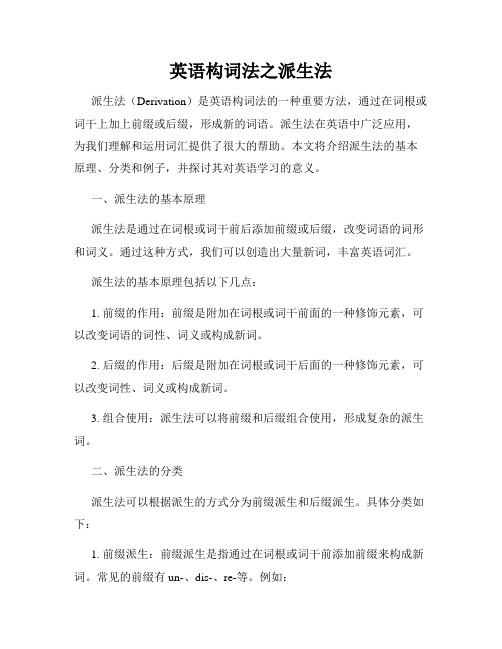
英语构词法之派生法派生法(Derivation)是英语构词法的一种重要方法,通过在词根或词干上加上前缀或后缀,形成新的词语。
派生法在英语中广泛应用,为我们理解和运用词汇提供了很大的帮助。
本文将介绍派生法的基本原理、分类和例子,并探讨其对英语学习的意义。
一、派生法的基本原理派生法是通过在词根或词干前后添加前缀或后缀,改变词语的词形和词义。
通过这种方式,我们可以创造出大量新词,丰富英语词汇。
派生法的基本原理包括以下几点:1. 前缀的作用:前缀是附加在词根或词干前面的一种修饰元素,可以改变词语的词性、词义或构成新词。
2. 后缀的作用:后缀是附加在词根或词干后面的一种修饰元素,可以改变词性、词义或构成新词。
3. 组合使用:派生法可以将前缀和后缀组合使用,形成复杂的派生词。
二、派生法的分类派生法可以根据派生的方式分为前缀派生和后缀派生。
具体分类如下:1. 前缀派生:前缀派生是指通过在词根或词干前添加前缀来构成新词。
常见的前缀有un-、dis-、re-等。
例如:- unlock(解锁)中的un-表示“解除”;- dislike(不喜欢)中的dis-表示“不”;- rewrite(重写)中的re-表示“再次”。
2. 后缀派生:后缀派生是指通过在词根或词干后添加后缀来构成新词。
常见的后缀有-er、-est、-ful等。
例如:- teacher(教师)中的-er表示“从事某种行为的人”;- tallest(最高的)中的-est表示“最”;- helpful(有帮助的)中的-ful表示“充满”。
三、派生法的例子以下是几个通过派生法构成的单词例子:1. 前缀派生的例子- Unhappy(不快乐):un-表示“不”,happy表示“快乐”,通过加入前缀un-,形成新的含义。
- Disappear(消失):dis-表示“否定”,appear表示“出现”,通过加入前缀dis-,形成相反的意义。
- Rebuild(重建):re-表示“再次”,build表示“建立”,通过加入前缀re-,表示再次进行建立。
派生构词法英语

派生构词法英语英语中的构词法主要有派生法(Derivation)、合成法(Composition)和转换法(Conversion)三大类。
接下来我们将依次分篇幅给读者朋友们解析这三大构词法。
今天重点解析的是现代英语构词法之派生法。
派生法(Derivation)指的是在一个词的词根(root)前面或后面加上某个词缀(affix)来产生新词,这种构词法称为派生法(derivation)或词缀法(affixation).加在前面的词缀叫前缀(prefix),加在后面的词缀叫后缀(suffix)。
一般情况下,前缀往往改变词义,不改变词性;而后缀往往改变词根的词性,有些也涉及意义的变化。
大部分前缀和后缀都有固定的意义,因而许多派生词的词义可以通过词根及词缀的意思推知。
一、前缀法(prefixation)通过在词根前面加词缀构成新词的方法叫前缀法。
一般情况下,它不改变新词的词性,只引起词义的变化。
许多名词、形容词、副词和动词是由词根加后缀构成的。
常见的表示否定或相反意义的前缀有:un-,dis-,in-,im-,ir-,il-等。
un- unhappy不高兴unlock 开锁dis- dislike不喜欢disagree不同意im- impossible不可能的improper不合适的in- informal非正式的incorrect不正确的Ir- irregular不规则的irrelevant不相关的il- illegal不合法的illogical不合理的常见的表达其他意思的前缀▶re-重新、再次regain再次获得reform改革▶mis-错误的misunderstand误解mislead误导▶anti-反、防anti-tank反坦克的anti-social危害社会的▶ex-前ex-president前总统ex-wife前妻▶Pre-预先preview预习predict预言、预测▶Post-之后的postwar 战后的postgraduate 研究生▶fore-之前的forecast预报foresee预见▶Super超级、上层supermarket超市superman超人▶sub-下面的;亚、次subway地铁subtitle副标题▶Inter-之间的,互相interact相互作用international国际的▶trans-跨越、移transport运输translate翻译▶Semi-半semi-final半决赛semiconductor半导体▶Vice-副vice-premier副总理vice-chairman副主席▶Uni-单uniform制服unilateral单方面的▶bi-双bicycle 自行车bimonthly双月的▶multi-多multinational多国的multicolor 多色的▶auto-自动、自主automation 自动化automobile汽车二、后缀法(suffixation)通过在词根后面加词构成新词的方法叫后缀法。
构词法—派生法(前后缀)
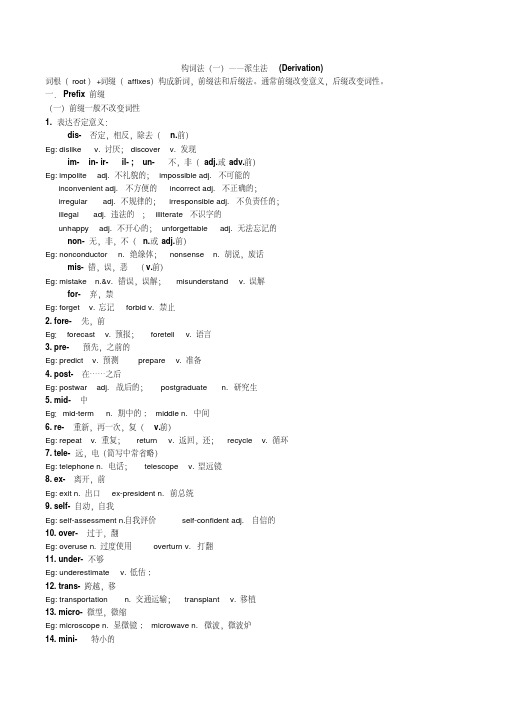
构词法(一)——派生法(Derivation)词根(root)+词缀(affixes)构成新词,前缀法和后缀法。
通常前缀改变意义,后缀改变词性。
一.Prefix 前缀(一)前缀一般不改变词性1. 表达否定意义:dis- 否定,相反,除去(n.前)Eg: dislike v. 讨厌;discover v. 发现im- in- ir- il- ; un- 不,非(adj.或adv.前)Eg: impolite adj. 不礼貌的;impossible adj. 不可能的inconvenient adj. 不方便的incorrect adj. 不正确的;irregular adj. 不规律的;irresponsible adj. 不负责任的;illegal adj. 违法的;illiterate 不识字的unhappy adj. 不开心的;unforgettable adj. 无法忘记的non- 无,非,不(n.或adj.前)Eg: nonconductor n. 绝缘体;nonsense n. 胡说,废话mis- 错,误,恶(v.前)Eg: mistake n.&v. 错误,误解;misunderstand v. 误解for- 弃,禁Eg: forget v. 忘记forbid v. 禁止2. fore- 先,前Eg:forecast v. 预报;foretell v. 语言3. pre- 预先,之前的Eg: predict v. 预测prepare v. 准备4. post- 在……之后Eg: postwar adj.战后的;postgraduate n. 研究生5. mid- 中Eg:mid-term n. 期中的; middle n. 中间6. re- 重新,再一次,复(v.前)Eg: repeat v. 重复;return v. 返回,还;recycle v. 循环7. tele- 远,电(简写中常省略)Eg: telephone n. 电话;telescope v. 望远镜8. ex- 离开,前Eg: exit n. 出口ex-president n. 前总统9. self- 自动,自我Eg: self-assessment n.自我评价self-confident adj. 自信的10. over- 过于,翻Eg: overuse n. 过度使用overturn v. 打翻11. under- 不够Eg: underestimate v. 低估;12. trans- 跨越,移Eg: transportation n. 交通运输;transplant v. 移植13. micro- 微型,微缩Eg: microscope n. 显微镜; microwave n. 微波,微波炉14. mini- 特小的Eg: miniskirt n. 迷你裙minibus 迷你公交车15. semi- 半Eg: semi-final n. 半决赛;semicircle n. 半圆16. mono- 单Eg: monologue n. 独白monopoly n. 垄断17. bi- 双Eg: bicycle n. 自行车bimonthly adj. 双月的18. tri- 三Eg: triangle n. 三角形triplet n. 三胞胎19. multi- 多Eg: multimedia n. 多媒体multinational adj. 多国的20. auto- 自动Eg: automatic adj. 自动的automobile n. 汽车21. sub- 下面的Eg: subway n. 地铁subtitle n. 字幕,副标题22. super- 超级,上层Eg: superman n. 超人;supermarket n. 超市23. inter- 之间的,相互Eg: international adj. 国际的Internet n. 超市(二)改变词性的前缀1. a- 向里,离开,加强(v.或n.前构成adj.或adv.,adj.前构成prep.或adv.)Eg: awake adj. 醒着的; along prep.沿着,顺着;aside prep.&adv. 在……旁边;在旁边2.en- 使成为(n.或adj.前构成v.)Eg: enjoy v. 享受encourage v. 鼓励enable v. 是能够二.Suffix 后缀:(改变词性)1. 名词后缀:1)-ship 状态,身份(n.或adj.后,构成抽象n.)Eg: friendship 友谊;hardship 艰难,困苦2)-ness 状态,性质(adj.后,构成抽象n.)Eg: business 生意;sadness 悲伤;happiness 幸福3)-man 人,男人(n.后)Eg:policeman 警察superman 超人4)-ion 动作,状态(v.后)Eg: action 动作invention 发明decision 决定5)-er, -or 人,动作者,职业(v.后)Eg: writer 作家;waiter 男服务员;actor男演员;doctor 医生6)-ist 职业;主义者(n.后)Eg: pianist 钢琴家;scientist 科学家;revolutionist 革命主义者7)-ese,-(ia)n 人,语言(国名后构成adj.或n.)Eg: Chinese 中国人,汉语;Japanese 日本人,日语;Russian 俄国人,俄语;Italian 意大利人,意大利语8)-th 结果,过程(adj.和v.后,构成抽象n.)Eg:truth 真相;length 长度9)-hood 身份,境遇,状态(n.后)Eg: childhood 童年;neighborhood 邻居10)-ty 性质,状态,程度(adj.后,构成抽象n.)Eg:honesty 诚实;safety 安全11)-age 状态,集合(v.或adj.后)Eg: shortage 短缺;marriage 婚姻12)-ment ……的结果,手段(v.后)Eg: movement 运动;development 发展13)–ure ……的动作或过程(v. 后)Eg: failure 失败;pleasure 愉快;pressure 压力14)–dom ……状态,地位(v.或adj.后)级别、地位(n.后)Eg: kingdom 王国freedom 自由15)–ity (adj.后)Eg: reality 现实;activity 活动;possibility 可能性16)–y 有……倾向的(v后)Eg: difficulty 困难;discovery 发现17)–al ……的过程或状态(v. 后)Eg: arrival 到达;refusal 拒绝;survival 幸存18)–ance ;–ence ……的动作或状态(v.后)Eg: dependence 独立;difference 不同;assistance 协助2. 形容词后缀:1)-ly 品质,……的,每……的(n. 后)Eg: friendly 友好的;weekly 每周的2)-able ;-ible 能够,可……的(v.或n.后)Eg: acceptable 可接受的;unforgettable 无法忘记的3)-ed ……的,动作(v.或n.后)Eg: excited 感到兴奋的;surprised 感到惊讶的4)-ing 属于,性质,动作,状态(n.后构成n.或adj.,加在v.后构成n.)Eg: exciting 令人兴奋的;surprising 令人惊奇的;shopping 购物4)-en 由……制的(n.后)Eg: wooden 木头的;woolen 羊毛的5)-ern 方向(表方向的n.后)Eg: western 西方的;northern 北方的6)-ful 充满,……的(v.或n.后)Eg: colorful 多彩的;wonderful 棒极了7)-less 无……的,没有,不(n.或v. 后)Eg: hopeless 无望的;careless 粗心的8)-ive ……的,有……的(v.后)Eg: active 活跃的;productive 多产的9)-y (充满)……的(n.后)Eg: sporty 运动的;tasty 美味的10)-ish (多为贬义词)像……似的(n.后)Eg:childish 孩子气的,幼稚的;foolish 愚蠢的11)-like 类似;像Eg: childlike 孩子般的,天真的;womanlike 像女人的12)-ous 具有……性质的(n.后)Eg: dangerous 危险的;famous 著名的;courageous 有勇气的13)-some 引起……的;有……倾向的(n.和v.后)Eg: troublesome 麻烦的;handsome 英俊的;tiresome 令人生厌的14)-ary 与……有关的;……的(n. 后)Eg: revolutionary 革命的;customary 通常的,习惯的15)-ate 富于或显示某种性质(n.后)Eg: fortunate 幸运的;passionate 激情的16)-ant;-ent 处于……状态的;进行……动作的Eg: dependent 依赖的;different 不同的;consistent 持续的17)-ic ……的,关于……的Eg: classic 经典的;historic 历史性的;energetic 精力旺盛的18)-al ……的(n.后)……的状态或过程(v.后)Eg: arrival 到达;refusal 拒绝;survival 幸存3. 动词词缀1)-ize; -ise 成为……;使像……;使……化;以……的方式对待或处理;置于(n.或adj.后)Eg: realize 实现;organize 组织;criticize 批评2)-en 使,变得(adj.后)Eg: widen 拓宽;deepen 加深;sadden 使忧伤3)-ify 使得;变得(n.或adj.后)Eg: identify 识别;classify vt.分类,归类4. 副词词缀-ly 品质,……地(adj. 后)Eg: beautifully 优美地;slowly 慢慢地5. 数词词缀:1)-teen 十几(13-19)Eg: fifteen 十五;nineteen 十九2)-ty 几十(整数)Eg: twenty 二十;thirty 三十3)-th 第几(除尾数为1,2,3的)Eg: fifth 第五;ninth 第九6. 代词词缀-self(-selves)反身代词Eg: myself 我自己;ourselves 我们自己。
英语构词法-派生法

• 6. -dom 表示状况,领域。 如:
freedom kingdom
• 7. 其它形式:-th,-ty,-ence (ance)
death length truth
honesty difficulty ability
importance silence difference
• III.动词后缀
• 6. -ly (adj.→adv. / n.→adj.)
finally quietly lovely friendly manly
7. 其它形式:-ish, -ic, -ical, -ive, -al(n.→adj.)
foolish basic scientific medical expensive selfish personal progressive
• 3. re- 表示“重新,再”, 用在动词 前。如:
rebuild 重新建造 recycle 再循环 reconsider 重新考虑 review 复习
Ⅱ.后缀 (postfix; suffix)
• I.形容词后缀
1. -able (n./v.→adj.)表示“可以……的;显 示……性质”。 如:
英语构词法-派生法
派生法: derivation
• 派生法(derivation)是英语主要的构词法, 用以丰富扩大英语的词汇量。这方法是借 前缀(prefix)或后缀(postfix;suffix)之助, 制造出派生词(derivative words),主 要有名词、形容词和动词三种。
Ⅰ.前缀(prefix)
»
respectable comfortable valuable fashionable loveable
英语构词法中的派生法
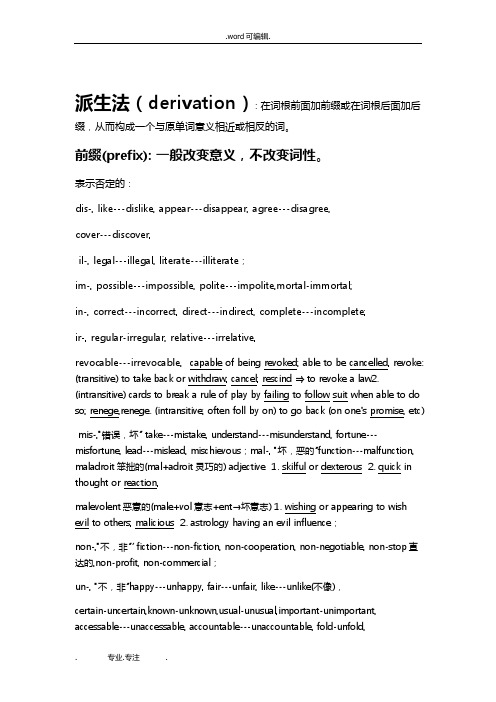
派生法(derivation): 在词根前面加前缀或在词根后面加后缀,从而构成一个与原单词意义相近或相反的词。
前缀(prefix): 一般改变意义,不改变词性。
表示否定的:dis-, like---dislike, appear---disappear, agree---disagree,cover---discover,il-, legal---illegal, literate---illiterate;im-, possible---impossible, polite---impolite,mortal-immortal;in-, correct---incorrect, direct---indirect, complete---incomplete;ir-, regular-irregular, relative---irrelative,revocable---irrevocable, capable of being revoked; able to be cancelled, revoke: (transitive) to take back or withdraw; cancel; rescind ⇒ to revoke a law2. (intransitive) cards to break a rule of play by failing to follow suit when able to do so; renege,renege. (intransitive; often foll by on) to go back (on one's promise, etc)mis-,“错误,坏” take---mistake, understand---misunderstand, fortune---misfortune, lead---mislead, mischievous;mal-, “坏,恶的”function---malfunction, maladroit笨拙的(mal+adroit灵巧的) adjective 1. skilful or dexterous 2. quick in thought or reaction,malevolent恶意的(male+vol意志+ent→坏意志) 1. wishing or appearing to wish evil to others; malicious 2. astrology having an evil influence;non-,“不,非”’ fiction---non-fiction, non-cooperation, non-negotiable, non-stop直达的,non-profit, non-commercial;un-, “不,非”happy---unhappy, fair---unfair, like---unlike(不像),certain-uncertain,known-unknown,usual-unusual,important-unimportant, accessable---unaccessable, accountable---unaccountable, fold-unfold,前缀a-,① 加在单词或词根前面,表示”不,无,非”, acentric 无中心的(a+centric中心的)asocial 不好社交的(a+social好社交的) ;amoral 非道德性的(a+moral道德的;注意:immoral apolitical.不关政治的(a+political政治的) anemia 反常的(a+nomal正常的+ous)② 加在单词前,表示”在…,…的” ,asleep 睡着的(a+sleep睡觉),aside 在边上(a+side旁边),ahead 在前地(a+head头),alive 活的(a+live活) awash .泛滥的(a+wash冲洗),alike(相似的,一样的);前缀中的: anti-, “反对,抵抗, against,opposed to,opposite of,instead”,anti-war, antitrust, antibiotic, antioxidant,antibody, antigen, anti-semitic等;auto-, “自动的,self, personally, 表示自己”, automate, automation 自动化,autograph 亲笔,autoalarm 自动报警器,autocriticism 自我批评,autorotation 自动旋转,autobiography 自传,autonomous [ɔː'tɑːnəməs]a. 自治的;automatic, automatically, autonomy, automobile,automated, autopsy, autograph亲笔签名,手稿, automotive, ,autocrat 独裁者,autocracy,automata, automaton, autoclave, automaker, autoindex自动索引;co-, “共同”,coworker, collegiate, colleague, cooperate;en-, “使”,enlarge, encourage, enhance, enable, enact, enroll, encompass,inter-,“相互,between在---之间”, international, internet, interview, intercontinental洲际的,interchange, interfere, interrupt, interpose,mini-, “小”, minibus, ,miniskirt, miniature, minify, minimum, minimal最低限度的,pre-,“在---之前”,pre-school, pre-reading, preview,precede v. to go or be before (someone or something) in time, place, rank, etc,precedent. a. If there is a precedent for an action or event, it has happened before, and this can be regarded as an argument for doing it again.president, precedent. unprecedented.re-, “再,又,重复”, repeat, rewrite, retell, return, review, rebound, reflect, reclaimsub-,“在下面”, subway, subordinate, submarine, suburban(urban城区),subconscious,subscribe,super-“超,在---之上”,supermarket, superman, superstar, supersonic, superficial, supervise, supernatural,tele-,“远”, telephone, telescope, television, telecommunication, telegram, 后缀(suffix): 通常使词由一种词类转化为另一种词类。
构词法中的派生词

构词法中的派生词构词法是语言学中的一个重要分支,研究的是词汇的形成和变化规律。
在构词法中,派生是一种常见的词形变化方式,通过增加前缀、后缀或者进行词干的内部变化,形成新的派生词,丰富了词汇的含义和形式。
本文将探讨构词法中的派生词,并举例说明其应用场景。
一、前缀派生词前缀派生是指在词根前面加上特定的前缀,以形成新的词汇。
常见的前缀包括un-、dis-、re-等。
1. un-前缀派生词un-前缀表示否定、反向的含义,使原词的意思相反或相对。
例如:- happy(快乐的)→ unhappy(不快乐的)- lock(锁)→ unlock(解锁)2. dis-前缀派生词dis-前缀表示否定、相反的含义,有时也表示分离、除去等意思。
例如:- agree(同意)→ disagree(不同意)- appear(出现)→ disappear(消失)3. re-前缀派生词re-前缀表示再次、重新的含义,常用于表示反复或重复的动作。
例如:- build(建造)→ rebuild(重建)- print(打印)→ reprint(重新印刷)二、后缀派生词后缀派生是指在词根后面加上特定的后缀,以形成新的词汇。
常见的后缀包括-er、-able、-ize等。
1. -er后缀派生词-er后缀常用于名词和动词的转化,表示施动者、从事者或物体的属性。
例如:- sing(唱歌)→ singer(歌手)- teach(教学)→ teacher(教师)2. -able后缀派生词-able后缀常用于形容词和动词的转化,表示具有某种性质或能力。
例如:- understand(理解)→ understandable(可理解的)- comfort(安慰)→ comfortable(舒适的)3. -ize后缀派生词-ize后缀常用于动词的转化,表示使某事发生或成为某种状态。
例如:- modern(现代的)→ modernize(使现代化)- organize(组织)→ organize(组织化)三、词干内部变化除了前缀和后缀的派生方式外,还有一种常见的派生方式是通过词干内部的变化来形成新的词汇,包括变音、变位等形式。
构词法-派生词
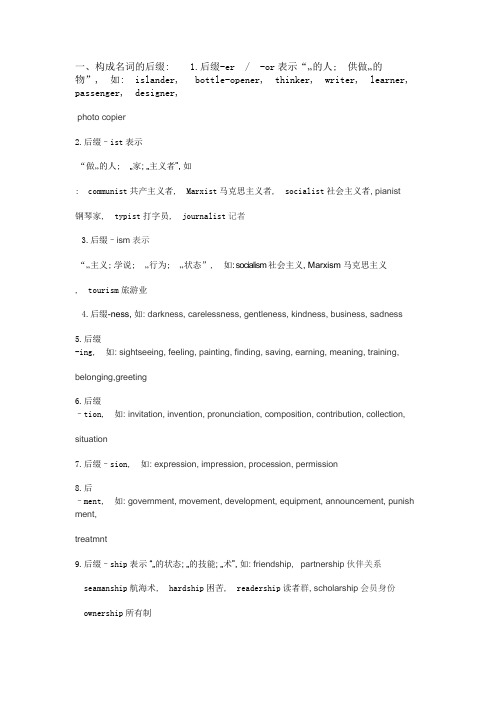
一、构成名词的后缀: 1.后缀-er / -or表示“…的人; 供做…的物”,如: islander, bottle-opener, thinker, writer, learner, passenger, designer,photo copier2.后缀–ist表示“做…的人; …家; …主义者”,如: communist共产主义者, Marxist马克思主义者, socialist社会主义者, pianist钢琴家, typist打字员, journalist记者3.后缀–ism表示“…主义;.学说; …行为; …状态”,如: socialism社会主义, Marxism马克思主义, tourism旅游业4.后缀-ness, 如: darkness, carelessness, gentleness, kindness, business, sadness5.后缀-ing, 如: sightseeing, feeling, painting, finding, saving, earning, meaning, training,belonging,greeting6.后缀–tion, 如: invitation, invention, pronunciation, composition, contribution, collection,situation7.后缀–sion, 如: expression, impression, procession, permission8.后–ment, 如: government, movement, development, equipment, announcement, punish ment,treatmnt9.后缀–ship表示“…的状态; …的技能; …术”,如: friendship, partnership伙伴关系seamanship航海术, hardship困苦, readership读者群, scholarship会员身份ownership所有制10.后缀–hood表示身份,资格,时间,集体, 状态, 如: brotherhood兄弟般的关系,likelihood可能性neighborhood邻里childhood童年时代boyhood少年时代girlhood少女时代11.后缀–ity, 如: reality现实ability能力activity活动possibility可能性, regularity正规, nationality国籍, disability残疾, minority少数12.后缀–ence, 如: difference区别, existence存在, silence沉默occurrence事件, reference提及, conference会议13.后缀-ance, 如: appearance出现, performance表演, acceptance接受assistance帮助, distance距离14.后缀-ure, 如pleasure快乐, failure失败, exposure暴露, closure关闭, mixture混合, gesture姿势15.后缀–ess表示女性或雌性, 如: hostess女主人, mistress主妇, lioness雌狮子, waitress女服务员16.后缀–th, 如: truth真理, strength力量, length长度, growth成长, depth深度17.后缀–al, 如: removal除去, survival幸存, proposal建议,t r i a l试验, approval承认18.后缀–ant表示“做…事的人或物”,如: accountant会计, applicant申请者, consultant请教者, servant服务员, assistant助手, expectant期待者19.后缀–ee表示“受…者,…行为者”,如: employee受雇者, payee收款人, referee受委托者, appointee 被任命者20.后缀–eer表示“与…有关, 从事…者”,如: volunteer自愿者, profiteer不当得者, racketeer 诈骗者21.后缀-ful表示“满量”,如: basketful一篮, handful一把, houseful满屋子22.后缀–ese表示“…的人, …语”,如: Japanese, Cantonese广东人, Vietnamese越南人, Viennese维也纳人二、构成形容词的后缀: 1.后缀–ful表示“充满…的, 有…性质的”,如: careful, useful, helpful, hopeful, powerful, painful, mercifu l2.后缀–less表示“无; 不做; 不能”,如: careless, hopeless,fatherless丧父的, harmless, rainless, countless无数的, speechless无言的3.后缀–able表示“能够; 适于…;值得…”,如: eatable, acceptable, laughable可笑的, comfortable4.后缀–ible表示“可(被)…的; 能…的”,如: responsible有责任的, permissible可允许的, divisible可分的, possible可能的5.后缀–ic表示“与…有关的; 像…的; 由…产生的”,如: heroic英雄的, historic有历史意义的, atomic原子的, energetic精力旺盛的, electric电的6.后缀–ive表示“拥有…的性质; 有…的倾向”,如: inventive发明的, imaginative富有想象力的, sensitive敏感的, effective有效的, expressive表情丰富的7.后缀–ous表示“具有…的; 多…的; 有…特性的”,如: various, nervous, continuous连续的, poisonous有毒的, anxious, mountainous多山的, dangerous, courageous英勇的8.后缀–y表示“有…的; 由…构成, 似…的; 有点的”,如: healthy, wealthy, rainy, windy, silky, greedy, smelly有臭味的9.后缀–ly表示“像…的; 有…性质的; 反复发生的”,如: friendly, motherly母亲似的, manly在男子气的, monthly每月10.后缀–ant表示“有…性质的”,如: important, distant, ignorant无知的11.后缀–ent表示“…的状态”,如: different, independent, impatient, frequent经常的excellent极好的12.后缀–en表示“由…制的”,如: wooden, woolen羊毛的, golden金的13.后缀–ern表示方向, 如: western, eastern, northern, southern14.后缀–al表示“像…的; 与…有关的”,如: personal, electrical电的,cultural, natural, national15.后缀–ish表示“似…的; …的”,如: selfish自私的, childish似孩童的, foolish16.后缀–like表示“像…的”,如: childlike孩子般天真的, godlike上帝般的, lifelike栩栩如生的17.后缀–ary表示“与…有关的; …的”,如: revolutionary革命的, imaginary虚构的, momentary瞬间的, primary首要的, ordinary普通18.后缀–ed表示“有…的; 特有…的”,如: skilled有技术的, talented有天赋林木茂密19.后缀–some表示“易于…的, 有…倾向的; 产生…的”,如: lonesome寂寞的, handsome英俊的, tiresome讨厌的, fearsome可怕的, burdensome沉重的20.后缀–an表示“…的, 与…有关的, …风格的”,如: Canadian加拿大的, Australian澳大利亚的, Mexican墨西哥的, American, European欧洲的三、构成动词的后缀:1.后缀–ize / -ise表示“使成为, 使能够, 作…处理”,如: realize实现,industrialize工业化, mechanize机械化, nationalize使国有化, revolutionize使革命化, modernize使现代化2.后缀–ify表示“使成为…的; 使…化”,如: beautify美化, terrify使惊吓, electrify电气化, magnify放大3.后缀–en表示“使有, 使得”,如: strengthen加强, deepen加深, darken使变黑shorten使变短, fasten扎牢4.后缀–ate表示“使, 作为…”,如: activate使活动, motivate激发, liberate 解放, separate分开, hibernate冬眠四、构成副词的后缀:1.后缀-ly, 如: really, simply, happily, publicly, happily, lastly, lately, excitedly2.后缀–ward表示方向, 如: upward, inward, westward, homeward, backward。
50-构词法之派生法
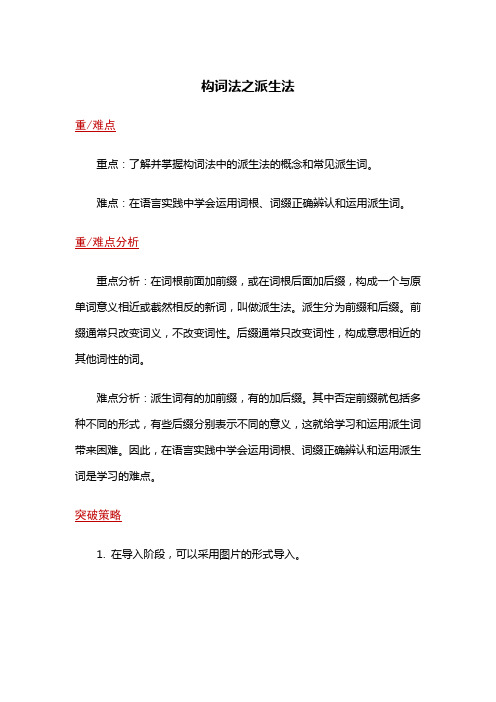
构词法之派生法重/难点重点:了解并掌握构词法中的派生法的概念和常见派生词。
难点:在语言实践中学会运用词根、词缀正确辨认和运用派生词。
重/难点分析重点分析:在词根前面加前缀,或在词根后面加后缀,构成一个与原单词意义相近或截然相反的新词,叫做派生法。
派生分为前缀和后缀。
前缀通常只改变词义,不改变词性。
后缀通常只改变词性,构成意思相近的其他词性的词。
难点分析:派生词有的加前缀,有的加后缀。
其中否定前缀就包括多种不同的形式,有些后缀分别表示不同的意义,这就给学习和运用派生词带来困难。
因此,在语言实践中学会运用词根、词缀正确辨认和运用派生词是学习的难点。
突破策略1. 在导入阶段,可以采用图片的形式导入。
比如,教师可以选用孔子名言的图片,教师呈现图片后,对图片内容进行描述“As Confucius put it, learning without thought is useless; thought without learning is dangerous. ”然后,教师指出:句中useless 和dangerous都是派生词。
那么,什么是派生词呢?在词根前面加前缀,或在词根后面加后缀,构成一个与原单词意义相近或截然相反的新词,叫做派生法。
派生分为前缀和后缀。
前缀通常只改变词义,不改变词性。
后缀通常只改变词性,构成意思相近的其他词性的词。
下面通过例句一起来学习构词法中的派生法。
2. 在语言感悟阶段,教师可以先提供例句,指出例句中派生词的构成,然后,和学生一起总结归纳该类派生词的构成和常用词汇,以此扩大词汇量。
课堂教学活动要体现学生的主体性,给学生留出足够的时间去讨论、归纳、总结。
在总结过程中,教师可以让学生先进行小组讨论,然后进行提问或者抢答,让学生说出相关派生词,教师要及时点拨。
当然,教师要及时肯定和表扬做得好的个人和小组,这也能够给学生带来学习的成就感,以此提高学生的课堂参与度与学习兴趣。
下面来分享中学时期的一次写作经历。
【语法全解】:派生词构词法
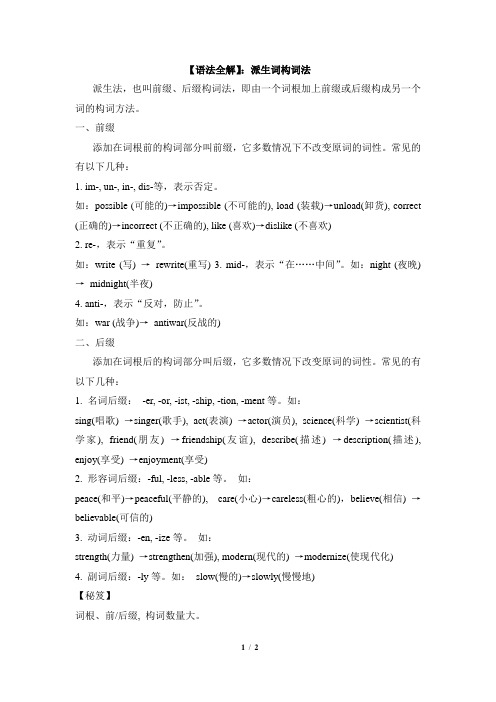
【语法全解】:派生词构词法派生法,也叫前缀、后缀构词法,即由一个词根加上前缀或后缀构成另一个词的构词方法。
一、前缀添加在词根前的构词部分叫前缀,它多数情况下不改变原词的词性。
常见的有以下几种:1. im-, un-, in-, dis-等,表示否定。
如:possible (可能的)→impossible (不可能的), load (装载)→unload(卸货), correct (正确的)→incorrect (不正确的), like (喜欢)→dislike (不喜欢)2. re-,表示“重复”。
如:write (写) →rewrite(重写) 3. mid-,表示“在……中间”。
如:night (夜晚)→midnight(半夜)4. anti-,表示“反对,防止”。
如:war (战争)→antiwar(反战的)二、后缀添加在词根后的构词部分叫后缀,它多数情况下改变原词的词性。
常见的有以下几种:1. 名词后缀:-er, -or, -ist, -ship, -tion, -ment等。
如:sing(唱歌) →singer(歌手), act(表演) →actor(演员), science(科学) →scientist(科学家), friend(朋友) →friendship(友谊), describe(描述) →description(描述), enjoy(享受) →enjoyment(享受)2. 形容词后缀:-ful, -less, -able等。
如:peace(和平)→peaceful(平静的), care(小心)→careless(粗心的),believe(相信) →believable(可信的)3. 动词后缀:-en, -ize等。
如:strength(力量) →strengthen(加强), modern(现代的) →modernize(使现代化)4. 副词后缀:-ly等。
如:slow(慢的)→slowly(慢慢地)【秘笈】词根、前/后缀, 构词数量大。
英语构词法
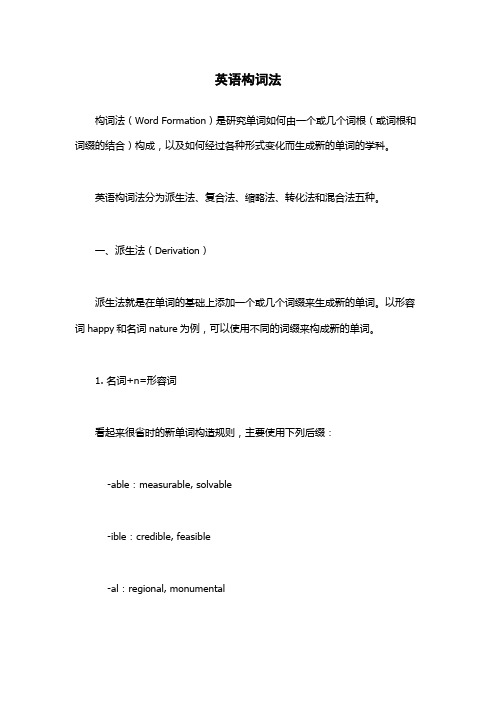
英语构词法构词法(Word Formation)是研究单词如何由一个或几个词根(或词根和词缀的结合)构成,以及如何经过各种形式变化而生成新的单词的学科。
英语构词法分为派生法、复合法、缩略法、转化法和混合法五种。
一、派生法(Derivation)派生法就是在单词的基础上添加一个或几个词缀来生成新的单词。
以形容词happy和名词nature为例,可以使用不同的词缀来构成新的单词。
1. 名词+n=形容词看起来很省时的新单词构造规则,主要使用下列后缀:-able:measurable, solvable-ible:credible, feasible-al:regional, monumental-ful:helpful, grateful-ic:heroic, hypothermic-ical:radical, historical-ous:dangerous, famous-y:windy, rainy例如:nature的派生词有natural、naturable、naturalistic、naturalized、naturelike等。
2. 形容词+n=名词可以把形容词后缀变为名词后缀,如-ism、-ity。
常见的派生词包括:-ism:communism, fascism-ity:prosperity, stability例如:happy的派生词有happiness。
3. 动词+n/v+ing=名词可以将动词转化为名词,通常使用-ment、-ing、-ion、-sion等词缀。
经典的派生词有:-ment:enjoyment, establishment-ing:fishing, reading-ion/sion:completion, conversion例如:enjoy的派生词有enjoyment。
4. 名词+n/v+er=动词通常使用词缀-ize、-fy、-ate、-en等,如:-ize:realize, prioritize-fy:satisfy, identify-ate:annihilate, elaborate-en:lengthen, strengthen例如:computer的派生词有computerize。
- 1、下载文档前请自行甄别文档内容的完整性,平台不提供额外的编辑、内容补充、找答案等附加服务。
- 2、"仅部分预览"的文档,不可在线预览部分如存在完整性等问题,可反馈申请退款(可完整预览的文档不适用该条件!)。
- 3、如文档侵犯您的权益,请联系客服反馈,我们会尽快为您处理(人工客服工作时间:9:00-18:30)。
国家或地区的( 语言) 7. -ese 国家或地区的(人;语言) Japanese, Vietnamese, Chinese, 8. -ist 主义的( 信仰… ①主义的(人);信仰…的(人) ②…家;…的操作者 Buddhist, Scottish, socialist, novelist, guitarist
6. -er ①做…动作的人 dancer, dinner 的器具cooker ②做…的器具cooker 住在或来自)… )…地方的人 ③ (住在或来自)…地方的人 Londoner, villager 精通/研究… ④精通/研究…的人 a geographer, ***an inventor, an actor
前缀: 前缀: 1.dis-表示“相反,否定;中断, 1.dis-表示“相反,否定;中断,消 除” 意。 disapprove, dishonesty, disconnect the machine, disinfect the wound, disagree
in- 否定,相反,不足” 2. in- “否定,相反,不足”表示相反 的性质。多用于adj, n.前 的性质。多用于adj, n.前。 insensitive, inattention, non-表示“ 3. non-表示“不,非” nonstop, nonnonalcoholic, nonsmoker, nonstick frying pan, un-表示“否定,相反,不足” 4. un-表示“否定,相反,不足”多 用于adj, verb前 用于adj, adv, verb前
行为(过程); );行为之 9. -ment 行为(过程);行为之 起因/手段/结果; 起因/手段/结果;…的状态 movement, replacement, development (…的 状态/性质/ 10. -ness (…的)状态/性质/程度 happiness,loudness, happiness,loudness, kindness, kindness,sadness
15. -ly ①cleverly, politically 每隔… ②每隔…时间 an hourly check, They visit him monthly. ③像…的,有…特征的 a motherly woman, a friendly welcome, an orderly office
ing某个动词的实例 某个动词的实例; 13. -ing某个动词的实例; 某个动词的动作或过程 swimming, No Parking, hold a meeting, doing, happening, belonging ise/14. -ise/-ize 成为; 变成…(状态) …(状态 使…成为;使…化;变成…(状态) modernize, privatize, realize,
构词法----派生 构词法----派生 ---前缀:dis- in- re- un- non前缀:dis- , in- , re- , un- , non- ; 后缀: 后缀:-able, -al, -an, -ful, -ive, st, -er, -ese, -st, -ment, -ness, ian, ise/-tion, -fy, -ian, -ing, -ise/-ize, -ly, teen, th, -teen, -ty, -th, -y
an eventful day, painful, two cupfuls of milk, a few mouthfuls of tea, a handful of, a shelfful of books, a roomful of people 性质/作用的( 东西) 5. -ive 有…性质/作用的(人/东西) an explosive, a detective, parents养父母 the adoptive parents养父母
特性, 16. -ty/ -ity 特性,状态 certainty, regularity , popularity 17. -y 满是/覆盖… ①满是/覆盖…的 倾向的,易于… ②有…倾向的,易于…的 dirty, hairy ,sleepy, cloudy, rainy, windy,
unfair, unhappy, unfortunately, The pipe’s blocked; we must unblock it. undress, undo, unfinish re- 表示“ 重新” 5. re- 表示“再,又,ห้องสมุดไป่ตู้新” rebroadcast, rewrite, reunite
American, African, historian, musician, politician, European, 4. -ful 充满… 特征的,引起… ① 充满…的 ②有…特征的,引起… 的 充满某容器所需之量;满口, ③充满某容器所需之量;满口,满 充满…的地方/ 把;充满…的地方/空间
tion/11. -tion/-ion 行为;状态;(动作或其过程的) ;(动作或其过程的 行为;状态;(动作或其过程的)结果 the completion of the task, election, eruption, explosion, 12. -fy / -ify 成为; 使充满; (使)成为; 使充满; purify, clarify, terrify, satisfy
后缀: 后缀: 1.– /---ible 1.–able /--ible 可被… ①可被…的 具有…性质的,处于… ②具有…性质的,处于…状态的 washable, unbreakable, knowledgeable, comfortable, unbelievably , sensible
--ial, 2. –al / --ial, ①与…有关的 ②…的动作 coastal waters, political, arrival, refusal, approval 3. –an/ -ean/ -ian, 地方的(人或物); );与 ①…地方的(人或物);与…有关的 人或物); (人或物); 精通/钻研… ②精通/钻研…的人
